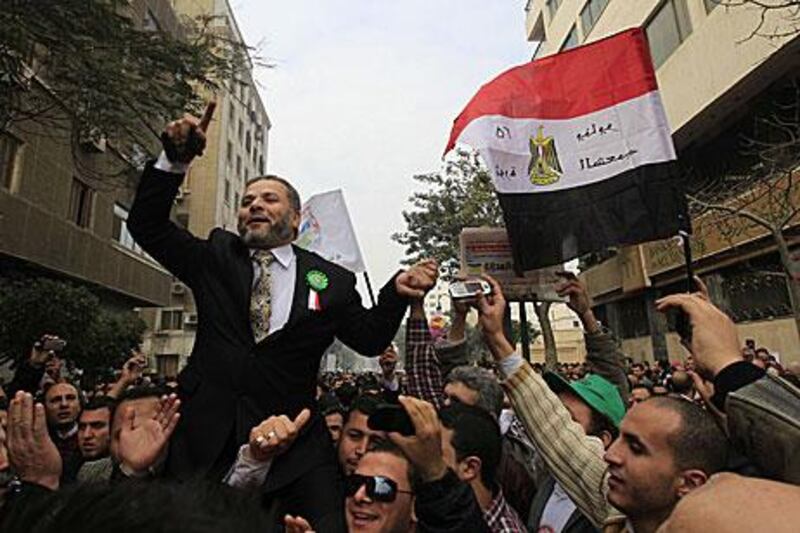CAIRO // As the newly elected members of parliament stood up to recite an oath to the Arab Republic of Egypt and its laws yesterday, citizens across the country watched with a mix of elation and unease.
The convening of the People's Assembly, the lower house of parliament, was the first time since last year's uprising that forced the resignation of Hosni Mubarak that the people had a representative body with a popular mandate.
To some, it was more than this, symbolising the culmination of the freest and most transparent elections in the history of a country long ruled by military tyrants, colonial occupiers and pharaohs.
Hundreds of Islamists gathered outside the parliament to cheer the victory of their representatives. They were flanked by antimilitary protesters and activists who pressed the parliamentarians to honour the goals of the revolution.
The auditorium of the parliament was filled with mostly men, many with long beards and religious garb, reflecting the domination of the elections by the same Islamist parties that Mubarak feared and repressed.
The Muslim Brotherhood's Freedom and Justice Party won 47 per cent of the seats, while the ultraconservative, Islamist alliance led by the Al Nour Party won 24 per cent. The liberal Al Wafd Party and another broader alliance of liberal parties called the Egypt bloc each won about 7 per cent.
But to many of the activists that took to the streets a year ago to protest against Mr Mubarak's rule, the convening of the parliament was a bitter compromise of the goals of what is referred to here as the "Egyptian revolution". The transition to democracy has been dictated, and some say manipulated, by the Supreme Council of the Armed Forces (Scaf) that has been in control of the country since Mr Mubarak resigned last February.
The meeting, which began at 11am and continued until the evening, came with its share of grandstanding.
Mamdouh Ismail, an ultraconservative lawyer, was rebuked by Mahmoud El-Sakka, 81, the eldest member of parliament and member of the Al Wafd party who was presiding over the inaugural session, for adding to his oath that he would also "abide by the law of God". Likewise, liberal members were asked to repeat their oath after adding that they would "fulfil the revolutionary demands" and "defend the blood of the martyrs".
Just minutes after oaths were finished, the auditorium broke into a fevered argument about how to elect the new speaker.
Members grabbed microphones, yelling disagreements amid sporadic rounds of applause as Mr El Sakka repeatedly bellowed out "please, sir, enough" to regain control of the assembly.
The theatrical scene reflected tensions inside the new body, but also on the streets yesterday that were filled with marches of artists, trade unionists and antimilitary demonstrators in what activist groups said was a preview of the one-year anniversary of the January 25 uprising when large protests and celebrations are set to take place.
"I'm very happy about the meeting," said Mustafa El Abasy, 55, who owns a grocery shop near the parliament building. "But it already looks like they are not able to organise themselves properly. They are trying to show off in front of each other … I still believe it is a good step forward."
The first task for the new parliamentarians will be to create a 100-person committee to rewrite the constitution. That debate will lay out the balance of power between the president, who will be elected by the end of June, and the parliament, as well as determine if the constitution should enshrine Islamic law in more definitive terms for future legislation.
It was a day of contrasts. At the same time as the 508 parliamentarians gathered, Mr Mubarak was sitting in a cage in a courtroom on the other side of the city where he faces charges of corruption and ordering the killing of more than 800 people who died during the 18 days of protests last year that ended his regime.
Gone were the National Democratic Party representatives who long dominated the parliament, such as Fathi Sorour, who was speaker of parliament since 1990. Mohammed Saad Al Katatny, a prominent Muslim Brotherhood official, was elected by the members of parliament to take up the position yesterday.
Follow
The National
on
[ @TheNationalUAE ]
& Bradley Hope on
[ @bradleyhope ]





